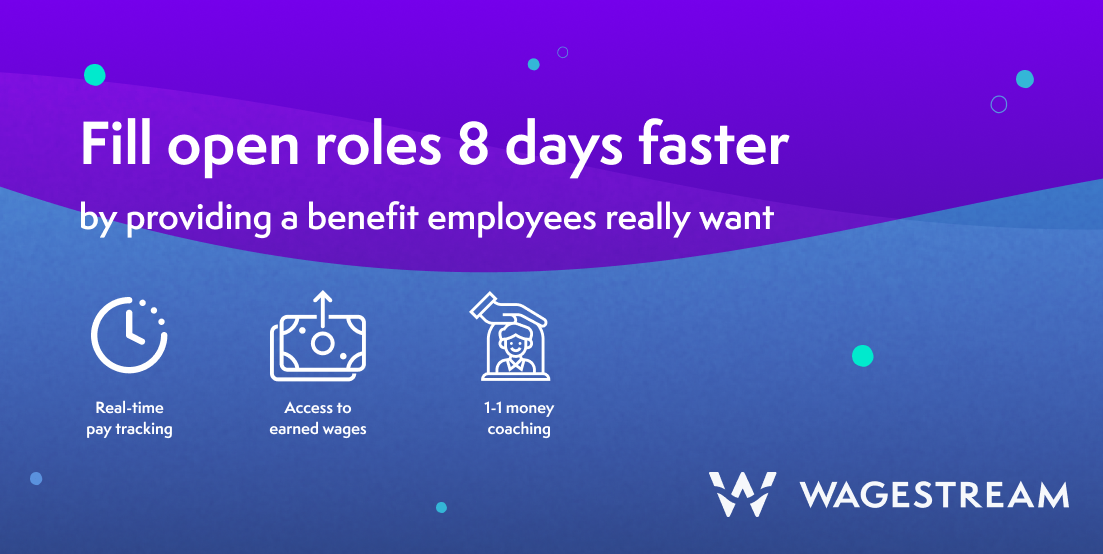

Wagestream was founded in 2018 when CEO Josh Vernon saw one of his friends get into trouble after using a payday loan to buy a fridge. Over the past 3 years Wagestream has grown to become the mission-led responsible experts in financial wellbeing, providing innovative solutions such as earned wage access, pre-pay savings and 1:1 live chat financial coaching to solve the number one concern of hospitality employees - financial stress.
Backed by social impact charities and industry bodies – Financial Inclusion Action Plan (FIAP) Social Tech Trust, Barrow Cadbury Foundation, Joseph Rowntree Foundation, Fair by Design and Big Society Capital – it’s our mission to make money simple not stressful, ensuring everyone has the tools they need to secure their financial futures. We support more than 750,000 employees across the globe at organisations such as Hungry Jack’s, Pizza Hut, Brewdog, Leon and many more.
Could wellbeing initiatives help you win the war for talent?

Throughout 2022 we’ve seen numerous reports of labour shortages across industries like hospitality, retail and QSR. An article in SMH called it a critical shortage while another article in the ABC said things were on a knife’s edge.
A host of CEOs have told the AFR they’re hiring but growing increasingly frustrated. There are a number of factors creating this competition for talent, including a lack of international travel and also concerns about job security during the pandemic.
This means that many businesses are thinking about what they can do to attract the best talent and how to do it quickly. One thing that’s become increasingly apparent is the importance of wellbeing initiatives in setting businesses apart.
Employers changing understanding of wellbeing
Our idea of wellbeing has evolved over the previous decades to now include mental, physical and financial wellbeing. In their book, Wellbeing: The five essential elements, Tom Rath and James Harter define wellbeing as:
“all the things that are important to how we think about and experience our lives.”
With broader recognition of this holistic idea of wellbeing, leading employers have made wellbeing the focus of all parts of their organisation rather than just the HR team.
Similarly, the demand for wellbeing across the board is growing from employees. The lockdowns and restrictions of Covid-19 have seen a reevaluation of the working experience for many and the idea of work-life balance and importance of supportive employers has only increased.
A survey from Harvard Business Review showed that 85% of workers felt their wellbeing had declined throughout the pandemic and such a notable shift has led to organisations like Black Dog Institute saying:
“Workplace mental health is an emerging public health crisis and requires immediate attention from both industry and policymakers.”
Employees changing understanding of wellbeing
It’s something employees recognise too. A study from PwC found that the wellbeing initiatives a business offers are almost as important as remuneration, with 22% of workers saying the top thing they look for from an employer is a wellbeing program that includes things like mental health support, lifestyle benefits and financial support programs. In comparison, 25% of workers said the main thing they look for is remuneration.
“We used to think about an employer’s duty of care ending the moment someone walked out the door, but now it’s so much broader and less easily defined.
“Employees expect more from their employer. And beyond it being the right thing to do, there is a clear return to the organisation. For every dollar spent by businesses on successful mental health programs, organisations can expect a return on investment of between $1 and $4 for an average return of $2.30.”
What workers want, PwC
Speeding up the time it takes to hire
A Wagestream study of 900 job ads on Indeed.com found that employers that listed Wagestream as a financial wellbeing program in their job ads filled open roles on average 27% faster than competitors who had no financial wellbeing offering.
So rather than a nice to have for employers, wellbeing programs now completely shape the employee experience and are a must for those looking to attract the top talent. Leading businesses understand that improving wellbeing is a key lever that can also drive business performance by ensuring employees are thriving at work and at home.
Connect Now
Other Articles

Mad Mex: focusing on wellbeing to boost recruitment

How QSRs can tackle cost of living crisis

Evolving wellbeing programs: Is it more effective to focus on prevention rather than cure?

How a financial wellbeing program has helped Honest Burgers recruit faster and fill more shifts in the UK

How QSRs can create flexibility for customer-facing workers

The secret sauce for improving financial wellbeing: an interview with Jenny McKie, Chief People Officer at Hungry Jack’s
